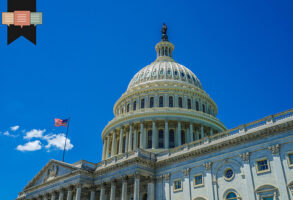
Published May 1, 2023
Until the self-identifying “transgender” murderer in Nashville and then the indictment of Donald Trump knocked it off the front pages, the big story of March was the banking crisis heralded by the failure of Silicon Valley Bank. All three stories were, of course, instantly politicized. What you thought about them stood virtually no chance of being determined by anything other than which side of the ever-widening political divide between Left and Right you stand on. What, we may wonder, is the point of paying attention to news or comment if everything that happens is instantly slotted into a preexisting narrative? This must be why ordinary people are increasingly tuning out the media, leaving that arena to become the playground of fanatics and obsessives seeking only for confirmation of and fellowship in what they already know.
Those of us whose memories reach back to the last banking crisis may remember the economists’ term of art: “moral hazard.” Or we may not, since most of those in public life who backed the bailouts of financial institutions in 2008—which was nearly everyone—didn’t like to be reminded of what, besides financial and job security for the bailees, the hundreds of billions of taxpayers’ dollars (it seemed like a lot of money at the time) were buying. And what they were buying, as the new bailouts make plain, was a tacit assurance that risky and imprudent and foolish and corrupt behavior in the future on the part of people entrusted with other people’s money would have no direct consequences (at least) for the other people, whose interest in policing such behavior would accordingly be lessened.
Back in 2008, my late friend the economist Allan Meltzer argued strenuously but to no avail against the media fearmongers who provided the precondition for ignoring moral hazard by predicting the much more serious consequences for the world economy if the holders of worthless mortgage-backed securities were not bailed out. One measure of the distance we have traveled in the last fifteen years is that, with the new bailouts, the renewal of the media’s fear campaign about universal catastrophe has for the most part not been thought necessary. Moral hazard is back on people’s lips but, this time, less as a warning than as a rueful regret for what everyone seems to agree is the inevitable bailout. “Janet Yellen essentially says all deposits are insured,” editorialized The Wall Street Journal: “From now on, moral hazard rules.”
Ms. Yellen later recanted and then recanted her recantation, but who cared? Everybody knew that it was all political theater and that the original statement, promising future bailouts ad infinitum, was the truth of the matter. In the same way, everyone knew that it was an untruth when she teamed up with Jerome Powell of the Federal Reserve and Martin Gruenberg of the Federal Deposit Insurance Corporation to assure us that “no losses associated with the resolution of Silicon Valley Bank will be borne by the taxpayer.” Literally nobody can have believed that to be true except in the most technical of senses, but hardly anybody cared about that either, no more than anybody cared when President Biden falsely (do I really need to add that modifier?) claimed that a $3.5 trillion spending bill actually cost “zero” (see “Deliberate falsehoods” in The New Criterion of November 2021).
The point is that people no longer expect our public men and women to tell the truth—about anything—and that this also constitutes a moral hazard, and arguably a much more serious one. The cascade of falsehood becomes unstoppable when the first barrier to it is breached. In a recent conversation with Matt Taibbi, the novelist Walter Kirn offered up this little jeu d’esprit:
You spoke a couple of weeks ago, or maybe last week, about the new mission of journalism, which doesn’t seem to be uncovering the truth anymore, but managing the information cycle. They act almost like banks that get money directly from the Federal Reserve. I call it “fiat information.” The government prints information and certain favored institutions are first in line to get it, and then they loan it to others for a profit. . . . And people begin to doubt it. Its only way to defend itself—because it’s ultimately trust that backs currency and it’s ultimately trust that backs the media—is to print more of it.
You could say that what links “fiat information” and the fiat currency that is being paid out to the depositors of Silicon Valley Bank is the need in both cases on the part of the government to keep alive by any means necessary the illusion of the true believers that it will always be able to provide them with the news or the money that they want and need to sustain their belief.
Of course the corollary of implicit belief in the government’s fiat information is an equal assurance that it must be the doubters in the anti-government party who are lying. Lies are only bad, it seems, when they are told by bad people, which makes it highly convenient as well as tautological that you can tell the bad people by the fact that they are liars—or rather, as Mr. Biden said of Donald Trump in their first debate of the election campaign of 2020, everybody knows that they are liars.
So, too, now everybody knows that Mr. Trump must be guilty of whatever it is New York District Attorney Alvin Bragg is charging him with because, well, he’s Donald Trump, a liar and a criminal by definition. This is something that everybody knows because of the outflow of fiat information in the last seven years. It should not be necessary to point out how this makes a mockery of our whole system of justice, as Nancy Pelosi inadvertently revealed when she wrote with ineffable smugness of the Trump team’s chance to “prove his innocence” in court. This was the woman who also made a mockery of Congress’s oversight function with the constitution and conduct of the January 6 committee of the 117th Congress (to say nothing of two impeachments of the same man), so it would have been surprising if she had even bothered to pay lip service to the presumption of innocence, once thought to be the cornerstone of the U.S. system of justice. Who cares about that now? All that matters is that the good guys are winning again and the certified bad guys are losing.
Every few months, it seems, I have another occasion to remind readers of the article published in these pages over a decade ago (see “Lexicographic lies” in The New Criterion of October 2012), in which I pointed out how the meaning of the word “lie” had changed when no one was looking. By then, even most reputable dictionaries allowed as at least a secondary meaning of the word “lie” what careful writers and speakers in former times would have insisted on calling a “mistake”—something distinguished from a lie by the absence of any intention to deceive. Just as, in law, a crime is defined by the existence of the mens rea or guilty mind, so in precise English you could not be said to lie if you sincerely believed that what you said was true. This is why, in the Mother of Parliaments, the words “lie” and “liar” are banned as unparliamentary language—not because it was supposed that members of Parliament never lied but because any debating chamber could not continue to function without the presumption of good faith on both sides.
I have also had many occasions since that article to remark on the extent to which America’s principal debating chambers, following the media, have forsaken debate for mere vulgar abuse, as opponents have been transformed into enemies and policy disagreements into personal hatreds. At the root of this sad and perhaps fatal development for the future of American democracy is the denial of the presumption of good faith presupposed by promiscuous charges of lying (also euphemistically called “disinformation”) against those with whom we disagree. And if anybody stands to gain from calling other people liars it is those, on the principle of cui bono?, who are or expect to be liars themselves, since their own lies (or, as we may say, fiat information), when called to the attention of public opinion, thus invite the now familiar response that “they all do it.”
But the moral hazard of presuming that only the politically unfavored “other” can lie falls not only on the putative liars but also on all of us who are left with no other means of distinguishing between truth and falsehood except whether it comes from the tribe of the liars or the truth-tellers, as in the old logical puzzle, now brought to life. If any mistake or wrong inference that the politically unfavored may make in public can be characterized by the media or those politically favored by the media as a “lie,” the corollary must be that the latter can never be mistaken or wrong themselves—at least not without admitting to a lie, which they have never done and will never do. Hence, they are making a claim to infallibility with every claim of “lying” against their opponents.
We all know, for example, that it is the opinion of Donald Trump that the 2020 election was “stolen” from him. But he dresses up his opinion as fact, which only invites his opponents to announce as fact that his opinion is a “lie,” as the media have told us, repeatedly and often, that it is. In the same way, his opinion that the Mueller investigation was a “witch hunt” was pronounced by The Washington Post “fact-checkers” to be a lie. At some level we must all know, too, that although either or both of these opinions may be mistaken, may be wrong, they cannot be lies as that word has traditionally been understood. In fact, it is a lie to say that they are lies. And a lie, too, in the old sense of the word, since there is an intention to deceive the reader into believing that the writer knows what he does not know, and cannot know. But this is one lie that the “fact-checkers” can never spot, for it would undermine the whole rationale for their misbegotten enterprise. That is their moral hazard and their license for self-dealing.
In his conversation with Matt Taibbi mentioned above, Walter Kirn went on to say: “What are we going to get next? Are we going to find out the election was stolen, and we all knew it? That’s a joke.” But is it a joke? We all know, to use Mr. Kirn’s formulation, or ought to know, that it is a lie to say that it is a lie to say the election was stolen, even if we don’t care—even if we are sure, as most people are, that the election was not stolen. We also know that the media and their Democratic allies have long arrogated to themselves the right to lie strategically. Is it not, then, at least plausible that this lie is also strategic and the stolen-election hypothesis more likely to be true than it would be otherwise?
In related news, by the time you read these words, we will have a better idea of the legal standing of the new definition of “lie.” Dominion Voting Systems is suing Fox News for $1.6 billion over the on-air claim by supporters of President Trump that the company’s voting machines in several states during the 2020 election had been rigged, or hacked, to convert Trump votes into Biden votes. Crucial to the plaintiffs’ case is the assumption that skepticism about such claims on the part of those who nevertheless put them on the air made the allegations into “lies” and not just wrong opinions.
In the old days, the idea would have been considered absurd. There has probably never been a political opinion—or a lie either—published by the media without some degree of skepticism on the part of the publishers about the truthfulness of the claim. But the charge that, in this case, Fox was deliberately deceiving its viewers was apparently plausible enough for the judge in the case to rule against Fox’s motion to dismiss on First Amendment grounds. Nor does it come as any surprise that activists in the legal profession, theoretically in the business of distinguishing between truth and lies, would be quick to take advantage of a chance to make their own claim, like the media’s, to infallibility—an infallibility that extends to all their utterances and must be treated as true by definition. Anything they say must be true just because they say it is.
Do you doubt it? How else can the whole governmental effort to patrol the internet for “disinformation,” lately revealed in the Twitter Files, be explained? Like the monarch in legal theory still technically in force in Great Britain, the sovereign government–media complex can do no wrong—for, if it could, the rationale for their ban on “mis-” or “disinformation” would disappear. That they know this themselves is shown by their retreat from any public justification of their claim to a monopoly of truth, as well as the fact that the purge of “disinformation” was carried out, with the cooperation of the media involved, surreptitiously and would never have come to light if Elon Musk had not chosen to spend $44 billion to acquire Twitter.
At this point, I can only recommend the reader to turn with all possible dispatch to the online magazine Tablet, which, on the eve of the Trump indictment (and therefore ignored because of it), published what I can only hope will be the definitive text on what its author calls the “Hoax of the Century.” Jacob Siegel, a former Army intelligence officer who served with the infantry in Afghanistan, has taken the opportunity afforded by the exposure of the Twitter Files to put the final piece of the puzzle into his narration of the strange history of the permanent government’s war on “disinformation.” This had its origins in the last Bush administration’s “Global War on Terror” and the license to government surveillance given by the Patriot Act, which the gwot spawned. Then, under President Obama, the attention of the nation’s security and intelligence services was turned inwards, whence the new threat of “disinformation” from “domestic extremists” was alleged to be coming. Mr. Siegel writes:
What we are seeing now, in the revelations exposing the inner workings of the state-corporate censorship regime, is only the end of the beginning. The United States is still in the earliest stages of a mass mobilization that aims to harness every sector of society under a singular technocratic rule. The mobilization, which began as a response to the supposedly urgent menace of Russian interference, now evolves into a regime of total information control that has arrogated to itself the mission of eradicating abstract dangers such as error, injustice, and harm—a goal worthy only of leaders who believe themselves to be infallible, or comic-book supervillains.
Sound incredible? Read the piece and it won’t. It’s called “A Guide to Understanding the Hoax of the Century: Thirteen ways of looking at disinformation,” and anyone who hasn’t read it can never again be taken seriously as a commentator on American politics or culture in the twenty-first century. It will of course still be ignored by the media, since it cannot be denied, even after the excitement and jubilation over the Trump indictment have passed. But I will be interested to see how long they can continue to ignore the obvious moral hazard into which our leaders—and themselves, and all of us—have fallen. Maybe not forever.
Mr. Bowman is well known for his writing on honor, including his book, Honor: A History and “Whatever Happened to Honor,” originally delivered as one of the prestigious Bradley Lectures at the American Enterprise Institute in 2002, and republished (under the title “The Lost Sense of Honor”) in The Public Interest.
Mr. Bowman is well known for his writing on honor, including his book, Honor: A History and “Whatever Happened to Honor,” originally delivered as one of the prestigious Bradley Lectures at the American Enterprise Institute in 2002, and republished (under the title “The Lost Sense of Honor”) in The Public Interest.








